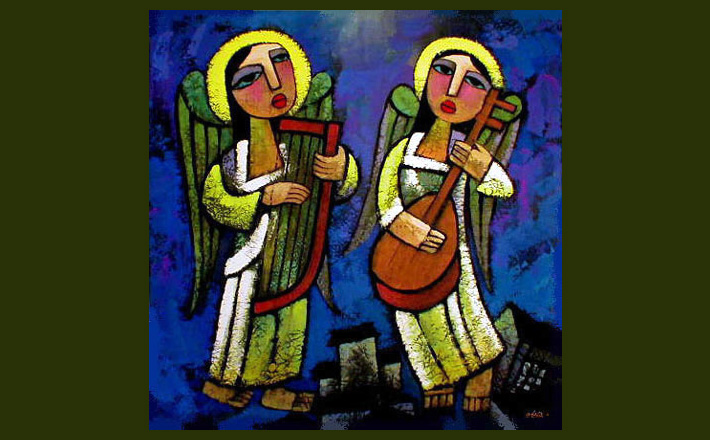Commentary on Psalm 96:1-9
According to 1 Chronicles 16, when David brought the ark to Jerusalem, he also appointed Asaph and other Levites to sing praises to God.
Their praise included Psalm 96 (minus the opening line and several others — see 1 Chronicles 16:22-33). In short, the Chronicler at least suggests the possibility that major portions of Psalm 96 may have been the “new song” called for in Psalm 96:1. If so, I cannot help but wonder if Asaph had to deal with the sort of reaction that pastors often get when they invite and encourage (or perhaps coerce) their congregations to “sing to the LORD a new song” (v. 1): “We didn’t know that hymn, Pastor; we like to the sing the old favorites.” Having no musical ability myself, I had some sympathy for my congregation when I received this response. But, as important as music is, the issue goes much deeper than music. The resistance to singing a new song is almost certainly accompanied by the refusal to consider the possibility that God is capable of, and is indeed doing, new things.
While “a new song” is mentioned elsewhere in the Psalter (see Psalms 33:3; 40:3; 98:1; 144:9; 149:1), it is probably the invitation in Isaiah 42:10 that offers the most significant background for assessing the significance of singing “a new song.” In the immediately preceding verse, the divine voice says this: “See, the former things have come to pass, and new things I now declare.” And in Isaiah 42:6-7, the servant of the LORD — which is almost certainly to be understood as the whole people of God — has apparently been given a new identity and vocation, which is to be “a light to the nations.”
Not surprisingly, there are numerous verbal and conceptual links between Psalm 96 and Isaiah 40-55. In addition to the mention of “a new song,” both Psalm 96 and Isaiah 40-55 proclaim “good tidings”/“good news” (Isaiah 40:9; 41:27; 52:7; “tell” in Psalm 96:2 represents the same Hebrew root); both call attention to God’s reign (Isaiah 52:7: Psalm 96:10); both call for a response of joyful singing (Isaiah 52:8; Psalm 96:12); and in both, God’s work of justice is for the whole world (Isaiah 42:1-4; Psalm 96:7, 10-13). Because Isaiah 40-55 can be dated reliably to the period around 539 BCE when the Edict of Cyrus allowed the exiles to return from Babylon, the “new things” God was doing probably referred most directly to the return from exile. This return, of course, did not involve the re-establishment of the Davidic monarchy. Thus, the “new things” God was doing probably should also be understood to refer to the new responsibility that the whole people would bear, given the absence of the monarchy, which had formerly been responsible for enacting the justice and righteousness that God wills (see Psalm 72). How better to worship the God who was doing new things for God’s people, and calling the restored people themselves to do new things, than to “sing to the LORD a new song”!
The question remains: Is there any continuity between the singing of a new song in the ancient past and our singing of a new song today? In short, how might we faithfully respond when we hear the opening invitation of Psalm 96 addressed directly to us? To be sure, there may be musical implications — that is, maybe we will not resist singing those new hymns. But, as suggested above, there is so much more to consider. Given the same old persistent, pervasive, deadly realities in our world — things like hunger, poverty, racial injustice, ecological degradation, militarism — will we identify where God is at work, willing and doing “new things”? Or, to employ more directly the language of Psalm 96, will we “tell of . . . [God’s] salvation from day to day” (v. 2)? Let me paraphrase that imperative: “Share the good news of God’s life-giving power every day.” As James L. Mays observes of Psalm 96, it “has a definite evangelical cast.”1
To be evangelists in the midst of a culture dominated by the dynamics of death will certainly mean to expose and name idolatry, as the psalmist does (v. 5) — idols of greed, racism, militarism, and misguided nationalism, all of which work to privilege some people at the expense of others (which, according to Psalm 82:1-2, is exactly what “the gods” were doing). In this regard, it is to be emphasized that the praise invited in Psalm 96 is to come from “all the earth” (see this phrase is vv. 1, 9, forming an envelope-structure for the lection). Note too the invitation in v. 7 that is addressed to “families of the peoples” (see Psalm 29:1-2). In short, God wills that the whole world be set right!
And appropriately, this is exactly what God is depicted as doing in Psalm 96:10-13. God “is coming to establish justice on earth. He will establish justice in the world with righteousness” (v. 13, my translation; see also CEB). And appropriately too, God’s work of setting the whole world right is greeted joyfully and enthusiastically by a world-encompassing community of praise — “the heavens … the earth … the sea … the field … all the trees of the forest” (vv. 11-12). By the way, God’s “coming” is not to be understood as a future event, but rather as an already occurring reality (since the Hebrew verb can be read either as an active participle or as perfect form).
Because God is in the world, working to set things right in “all the earth,” we sing a new song. And the singing of a new song energizes us to join God at God’s work in the world. The final time that the Psalter invites the singing of “a new song” is Psalm 149:1. As the Psalter nears its conclusion, it affirms that God’s people (see “the faithful” in vv. 1, 5, and “all his faithful ones” in v. 9) have been called to work among “the nations” and “the peoples,” in order “to do the justice that is written” (v. 9, my translation). Ultimately, then and now, the singing of a new song situates God’s people in an expansive community of praise (Psalm 96:1, 7, 11-12), and it involves God’s people in God’s ongoing work of setting the world right!
Notes:
1 James L. Mays, Psalms (Interpretation; Louisville: John Knox Press, 1994), 308.


May 29, 2016